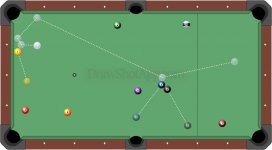... I've need seen an offensive linemen after a play say hey dude I jumped off sides..or and nba player say I walked on that play. ...
Behavior/culture/tradition in other sports is irrelevant to me on this issue. I strongly dislike many things about our "major" sports. But in pool, I just want everyone to observe the rules. The game goes better that way.
trob said:... I'll give you a dishonest situation and this happens in bca at least once or twice a year. a player bumps the ball with his tip while aiming..realizes it then quickly fires off the shot so you can't call it.
Of course you can call that as a foul. If he bumped the CB with his tip while aiming, his inning should have ended right there, and it probably was a foul if no ball hit a rail. The inning should have passed to the opponent. So if he "quickly fires off the shot" he has played out of turn, which is a foul.
Last edited:
